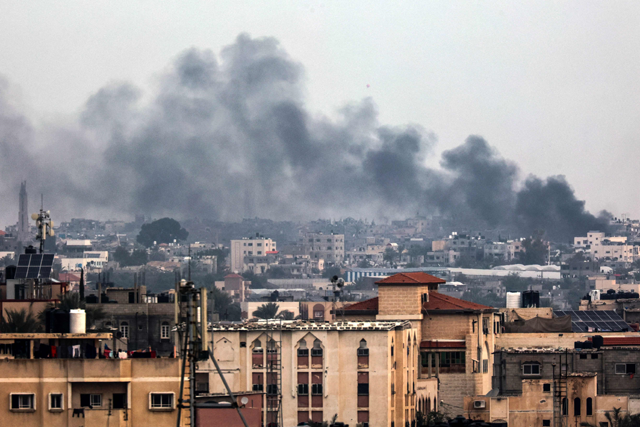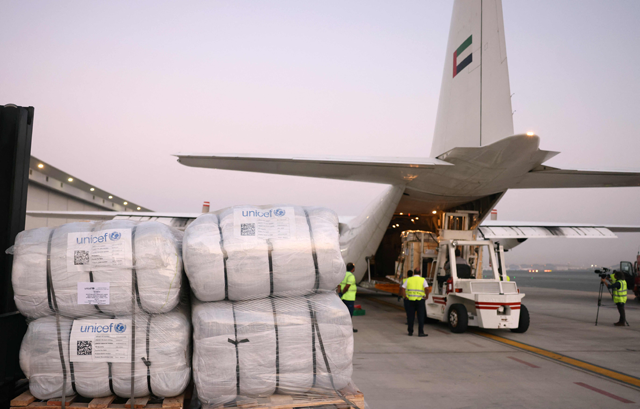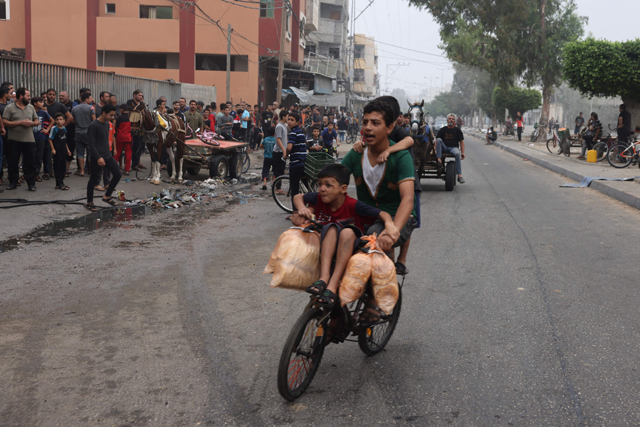You are here
Famine risk rising in Gaza — UN
By AFP - Jan 23,2024 - Last updated at Jan 23,2024

A photo taken from Rafah shows smoke billowing over Khan Yunis in the southern Gaza Strip during Israeli bombardment on Sunday (AFP photo)
GENEVA — The population of the Gaza Strip faces an increasing risk of famine as the Hamas-Israel war drags on, the UN's World Food Programme warned Tuesday.
"The situation in Gaza is of course slipping every day into a much more catastrophic situation," with "a looming threat of famine", Abeer Etefa, the WFP's senior Middle East spokeswoman told a press briefing.
A study conducted between November 24 and December 7 found that all 2.2 million people in the Palestinian territory were in a crisis level of food insecurity.
The picture has deteriorated since, said Etefa, speaking by video link froom Cairo.
"More than half a million people in Gaza are facing catastrophic food insecurity levels and the risk of famine increases each day."
Etefa said that even with the long years of conflict in places like Syria, Yemen and Sudan, "we haven't seen that high a level of the number of people in these conditions in such a short span of time".
She recalled that Gaza now has "the largest concentration of people in what looks like famine-like conditions anywhere in the world".
'People becoming more desperate'
The Gaza war broke out with Hamas's unprecedented October 7 attacks, which resulted in the deaths of about 1,140 people in Israel, mostly civilians, according to an AFP tally based on Israeli official figures.
Israel's relentless offensive in response has killed at least 25,490 people in Gaza, around 70 percent of them women, children and adolescents, according to the health ministry in the Hamas-run territory.
Etefa said about 70 percent of WFP requests to deliver food to northern Gaza were rejected by the Israeli authorities.
The last deliveries to the north were around January 11 and 13, carrying 200 tonnes of food for 15,000 people in Gaza City.
"That's really very, very small numbers," Etefa said.
"This is why we're seeing people becoming more desperate," as they have no idea when the trucks might come again.
The UN’s humanitarian agency OCHA said that in the first two weeks of January, only seven of 29 planned missions to deliver life-saving supplies to northern Gaza were permitted by the Israeli authorities.
Etefa called it “systematic limitation”, while a communications blackout in Gaza was also hindering the distribution of food.
Begging for food in hospitals
Since October 7, the WFP has sent 1,403 trucks carrying more than 24,000 tonnes of food into Gaza, including over 730 trucks carrying more than 13,000 tonnes in January so far.
It has a further 21,000 tonnes of food supplies — enough for the two million people in Gaza for one month — which are either in stores in neighbouring Egypt, on the way to Gaza or already on trucks on the border.
Gaza bakeries are producing an average of one million bread loaves per day, it added.
The UN humanitarian agency said this week that only 15 bakeries are still functioning in Gaza.
Meanwhile World Health Organisation spokesman Christian Lindmeier said one recent mission to deliver fuel to hospitals was repeatedly held up by people “desperately looking for food”, with the team having to show that “there’s nothing to eat” on board.
“We have very grave reports from inside the hospitals: People begging as they are lying waiting for surgery, begging for water and food. Horrible scenarios on the ground,” he added.
Related Articles
RAFAH, Egypt — Relief convoys which have been waiting for days in Egypt were on Tuesday headed towards the Rafah border crossing with the be
AMMAN — The UK embassy in Jordan announced on Thursday that the UK’s largest delivery of aid to Gaza has crossed the border and is being dis
RAFAH, Occupied Palestine — Etidal Al Masri got up before dawn to reach the bakery in Rafah in the hopes of getting enough bread to feed her


















